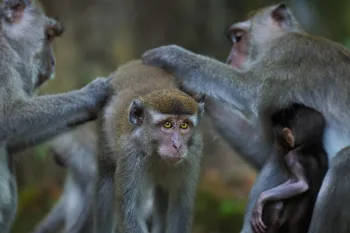OTTAWA, Ontario—Humane World for Animals Canada, formerly called Humane Society International, is calling on the federal government to immediately end the inhumane importation of wild-caught macaques. Earlier this year, there was speculation and outrage that macaques imported from Cambodia and labeled as captive-bred could have been wild-caught. Newly obtained data confirm that between 2021 and 2023, Canada imported nearly 1800 wild-caught macaques from both Cambodia and Mauritius. Of these, 1,772 were endangered long-tailed macaques captured from the wild in Mauritius; and an additional 24 wild macaques were imported from Cambodia. Canada now stands alongside the United States as one of the world’s top importers of wild, endangered macaques, a practice that causes immense animal suffering, increases the risk of future pandemics, and undermines scientific reliability.
“Canada must not become a safe haven for corporate greed that exploits endangered wildlife and jeopardizes public health,” said Shaarika Sarasija, Ph.D., program director, research and regulatory science. “We urge the government to take decisive action to stop these imports to protect animal welfare, public health, and scientific integrity.”
The long-tailed macaque was listed as an endangered species by the International Union for Conservation of Nature (IUCN) in 2022 but continues to be the most widely used non-human primate in research and testing. Following China’s suspension of macaque exports during the COVID-19 pandemic, demand surged globally, creating a supply gap that Canada appears to be exploiting.
The trade in wild macaques raises serious concerns, with the animals suffering intensively during capture, transport, and captivity. Moreover, wild primates pose a significant public health risk, carrying diseases that could spread to humans and even resulting in future pandemics. Captive-bred primates yield unreliable results—and wild-caught animals are an even greater liability, lacking standardized history or genetic profiles. According to publicly available Statistics Canada data, the majority of these wild macaques are being imported to facilities in Quebec.
Humane World for Animals is calling on the Government of Canada to:
- Ban the import (except for sanctuary rehabilitation), sale and use of wild-caught primates.
- Take meaningful action to improve the welfare of all wild macaques imported into Canada at the importer’s expense.
- Invest in cruelty-free New Approach Methodologies (NAMs) based on human biology.
- Improve transparency by advocating for organizational-level reporting on primate use in Canadian Council on Animal Care (CCAC) data and review of all protocols involving primates by scientists from animal welfare NGOs
FACTS
- Long-tailed macaques were classified as 'Endangered' by the IUCN in 2022. They are the most widely used non-human primates in research and account for 10% of global animal export value.
- Each macaque has a commercial value exceeding $15,000. Demand surged after China, previously the largest supplier, suspended exports due to the COVID-19 pandemic. Canada began importing wild macaques following this development.
- Canada and the U.S. together account for nearly 99% of all wild-caught macaque imports post-pandemic. Canada alone imported 12% of the global total between 2021–2023 (CITES trade data is only available up until 2023).
- The Canadian Council on Animal Care does not currently provide institution-level breakdowns of primate or other animal use, limiting transparency and accountability.
